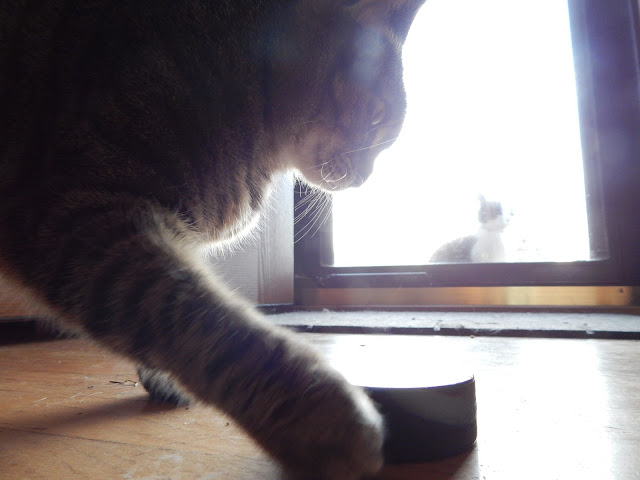Aren't my eyes just so pretty? My mom always tells me they are. I agree. Speaking of my pretty brown eyes, that's just one of the fun facts I'm going to grace you all with today.
That's right. I may not be a cat, but I still wanted to participate in answering the 18 facts that our stunning pal CK first shared on her blog not long ago. I hope you kitties out there don't mind me joining in on the fun. I mean, I do really like cats, if that helps you make up your mind about me.
So, here are some fun facts about me!
1. Favorite smell – Peanut butter! If I smell peanut butter, it better be going into my mouth.
2. Last time I hissed – That's not really my style. Actually, any form of vocalization isn't really my style. My mom always asks me why I'm a mute. (Because you talk enough for the both of us, lady, that's why.)
3. Favorite pizza – Any pizza will do. Extra cheese would be much appreciated.
4. Favorite flower – Grass. I like to eat grass. Even when my mom tells me not to.
5. Favorite dog breed – Mutts like me.
6. Favorite ice cream – Ice cream! I'll take any and all ice cream you have, please.
7. Pet peeve – When humans try to groom me. I don't really like being combed, or having my nails trimmed, or being bathed. Hands off, humans, I look gorgeous already. If they insist, though, I will only cooperate if I get peanut butter.
8. Shorts or jeans – I don't really like to play dress-up. What's so wrong with going out in the nude?
9. Color of your PTU – I don't have to be incarcerated to go outdoors.
10. Color of your eyes – Brown. Did you see my pretty picture above?
11. Favorite food – Peanut butter!
12. Least favorite food – Any and all fruits and veggies. Yucky, nasty, disgusting health food.
13. Favorite holiday – Um, how about Christmas? My mom tells me Christmas isn't all about the gifts, but I really do like getting gifts. I guess my birthday is pretty fun then, too. I got lots of goodies for my birthday last week.
14. Night owl or morning person – Neither. I love my beauty sleep, and I prefer to go to bed early and sleep in late.
15. Favorite day of the week – As long as I get a walk, lots of attention, and some peanut butter, I'll take whatever day it is. Oh, and if I get to see my Pawpaw, that's the best day ever.
16. Do you have a nickname? I get called Puppy and Puppy Dog a lot, which I don't mind so much. I also get called Big Girl. My mom thinks it's funny to call me Astrid Disastrid. Get it? It's a play on my name and the word "disaster", apparently, because it would seem that I tend to leave a bit of destruction in my large-bodied wake. So be it.
17. Favorite music – None, please. If music starts to play when I'm trying to nap, I will leave the room. I want my peace and quiet.
18. Tattoos – I have a scar where my cancerous toe was removed that I like to show off like a tattoo. Does that count?
Woofs,
Astrid
Today is the last day of National Cat Health Month. For our final tip, we're closing out our discussion on medication administration with subcutaneous injections. This topic might sound scary, but with some practice, and perhaps a cooperative kitty, you can become a pro at it.
First and foremost, ensure that you and your kitty are as comfortable and ready as possible for injection time. This may indeed take trial and error. It may also take time for your kitty to become accustomed to injections. One option is to have your cat sit on your lap. You can place a towel or blanket on your lap, as an added protection against claws. Placing your kitty on a table, counter, or even the back of a sturdy chair or couch are other potential options. If you have a helper, they can try to hold your kitty, with said kitty wrapped in a blanket or towel if needed, while you give the injection.
That being said, before getting too far ahead of yourself, make sure that you properly prepare the syringe and needle. If you have any questions regarding the use of a syringe and needle, of course ask your veterinarian, or even request a demonstration. Once you get used to it, it's really not as scary as it seems. With the needle and syringe ready, depending on the medication being injected, be sure to shake, roll, and invert the bottle as needed. Then, of course, using the needle and syringe, draw up the prescribed dosage.
Giving a cat a subcutaneous injection is often best done in the skin near their shoulders. Sometimes, if needed, it can also be given in the skin of the legs, near the hipbones. Before giving the injection, you will need to "tent" your kitty's skin. In other words, pick up the skin between your thumb and index finger. If you are right-handed, you can do this with your left hand, so that you can give the injection with your right hand. While preparing to inject, try to keep the needle more or less parallel to the cat's back, as going in at too much of an angle could lead to issues such as going through the skin on the side or hitting muscle.
Now, with the needle parallel to the back, you will want to give the injection in the "tent" of skin that you've formed by pulling up the skin. Push the needle into the skin firmly enough to slide the needle through, but not so hard that the needle ends up going through the skin on other side, or that the syringe slams against your cat's tented skin. Again, this all might sound scary, but the more times you do this, the more you you will get the feel of it.
At this point, obviously, you will inject the medication. Push the syringe's plunger, making sure that you don't wiggle the syringe and needle too much while you do this. Depending on how you feel most comfortable holding the syringe, you will typically be pressing the plunger with either your index finger or thumb. Once you have given the injection, slide the needle back out, place the safety cap on it, and safely dispose of it. Check to make sure that there is no moisture on your cat's back, which might indicate that the needle either went through to the other side, or that it did not go in at all.
Related to this, if you are giving subcutaneous fluids, such as for a kitty with kidney disease, the general procedure will be very much the same, but the fluids will take longer to complete. You will inject the needle in the same manner as mentioned above, but your kitty will need to remain in place for minutes at a time. So, be sure that both you and your kitty are comfortable before beginning subcutaneous fluids administration. Also be sure that you follow other instructions for giving fluids at home, including warming the fluids bag, ensuring the line has been tested, and so forth. Veterinarians will most often give a demonstration on fluid administration before having you do it on your own. Of course, never be afraid to ask your veterinarian any questions that you have regarding any form of medication administration.
Woofs,
Astrid
***
Our Doodle of the Day:
***
Our Tip of the Day:Today is the last day of National Cat Health Month. For our final tip, we're closing out our discussion on medication administration with subcutaneous injections. This topic might sound scary, but with some practice, and perhaps a cooperative kitty, you can become a pro at it.
First and foremost, ensure that you and your kitty are as comfortable and ready as possible for injection time. This may indeed take trial and error. It may also take time for your kitty to become accustomed to injections. One option is to have your cat sit on your lap. You can place a towel or blanket on your lap, as an added protection against claws. Placing your kitty on a table, counter, or even the back of a sturdy chair or couch are other potential options. If you have a helper, they can try to hold your kitty, with said kitty wrapped in a blanket or towel if needed, while you give the injection.
That being said, before getting too far ahead of yourself, make sure that you properly prepare the syringe and needle. If you have any questions regarding the use of a syringe and needle, of course ask your veterinarian, or even request a demonstration. Once you get used to it, it's really not as scary as it seems. With the needle and syringe ready, depending on the medication being injected, be sure to shake, roll, and invert the bottle as needed. Then, of course, using the needle and syringe, draw up the prescribed dosage.
Giving a cat a subcutaneous injection is often best done in the skin near their shoulders. Sometimes, if needed, it can also be given in the skin of the legs, near the hipbones. Before giving the injection, you will need to "tent" your kitty's skin. In other words, pick up the skin between your thumb and index finger. If you are right-handed, you can do this with your left hand, so that you can give the injection with your right hand. While preparing to inject, try to keep the needle more or less parallel to the cat's back, as going in at too much of an angle could lead to issues such as going through the skin on the side or hitting muscle.
Now, with the needle parallel to the back, you will want to give the injection in the "tent" of skin that you've formed by pulling up the skin. Push the needle into the skin firmly enough to slide the needle through, but not so hard that the needle ends up going through the skin on other side, or that the syringe slams against your cat's tented skin. Again, this all might sound scary, but the more times you do this, the more you you will get the feel of it.
At this point, obviously, you will inject the medication. Push the syringe's plunger, making sure that you don't wiggle the syringe and needle too much while you do this. Depending on how you feel most comfortable holding the syringe, you will typically be pressing the plunger with either your index finger or thumb. Once you have given the injection, slide the needle back out, place the safety cap on it, and safely dispose of it. Check to make sure that there is no moisture on your cat's back, which might indicate that the needle either went through to the other side, or that it did not go in at all.
Related to this, if you are giving subcutaneous fluids, such as for a kitty with kidney disease, the general procedure will be very much the same, but the fluids will take longer to complete. You will inject the needle in the same manner as mentioned above, but your kitty will need to remain in place for minutes at a time. So, be sure that both you and your kitty are comfortable before beginning subcutaneous fluids administration. Also be sure that you follow other instructions for giving fluids at home, including warming the fluids bag, ensuring the line has been tested, and so forth. Veterinarians will most often give a demonstration on fluid administration before having you do it on your own. Of course, never be afraid to ask your veterinarian any questions that you have regarding any form of medication administration.








































